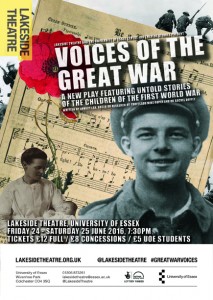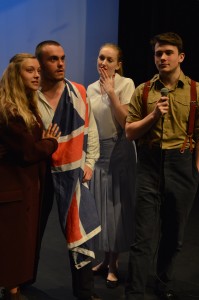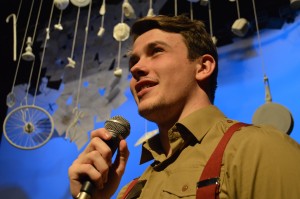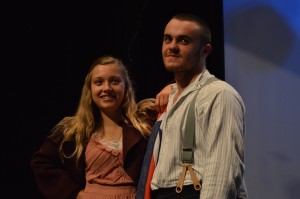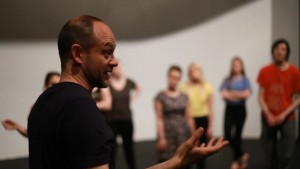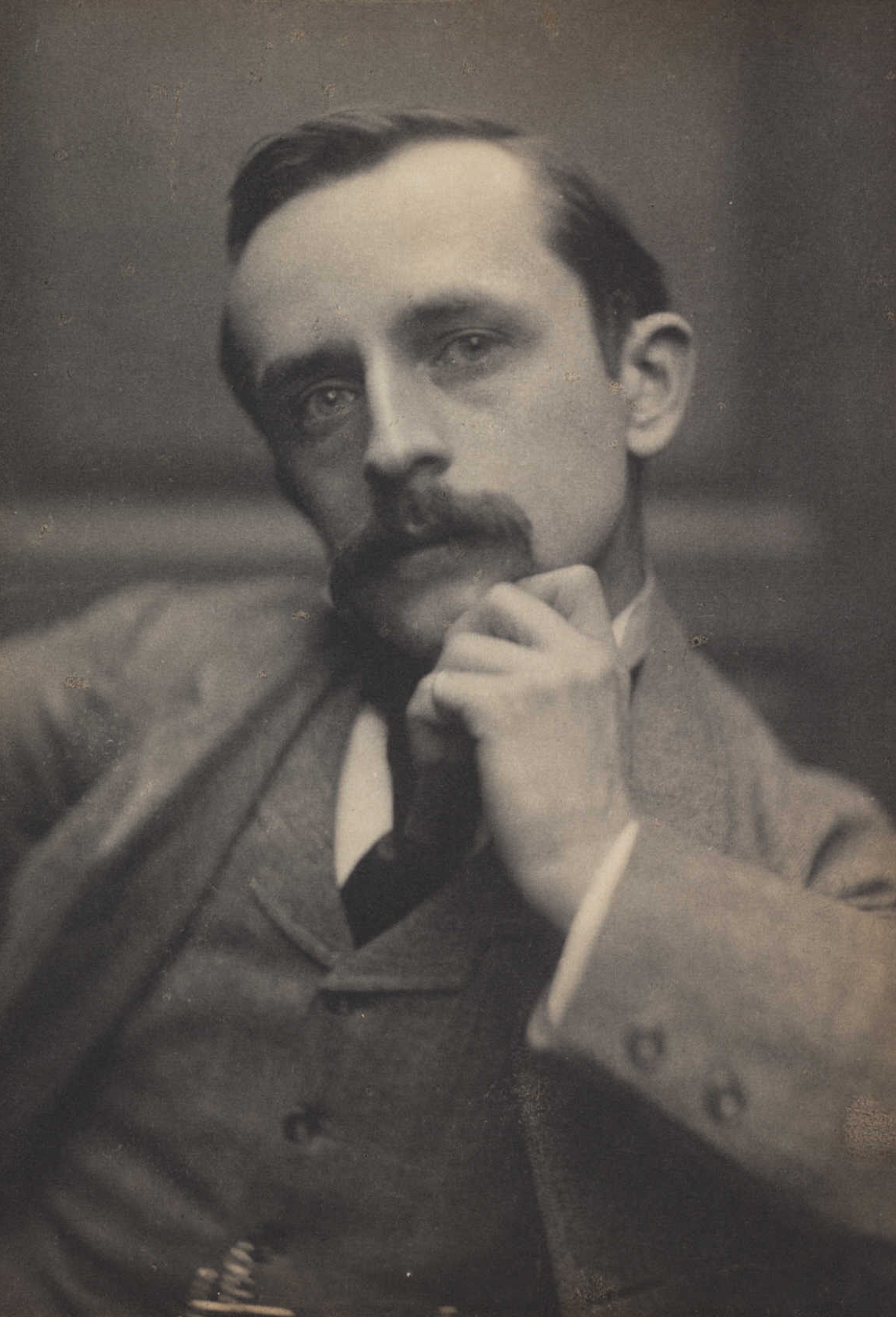Contributed by Rachel Duffett – 27th May
It was fascinating to watch theatre practitioners and drama students gather together in the Lakeside Theatre last week to embark on the ‘Voices of the Great War’ project which has recently been awarded funding by the HLF. The students and the theatre’s youth group will work with professionals to develop original First World War testimony collected by Mike Roper and Rachel Duffett into a structured performance which will capture the true impact of the war on families both during and after the conflict. Mike’s project ‘The Generation Between’ is currently exploring the way in which the children of veterans grew up with a war which, in many cases, had ended before their birth, but lived on in a family life shaped by their fathers’ experiences. It is Mike’s recordings of interviews with these children – now very elderly themselves – which will form the spine of the performance. Innovative drama techniques such as verbatim theatre will be used to bring the testimony to life – the workshop on Wednesday was the first stage in this exciting process.
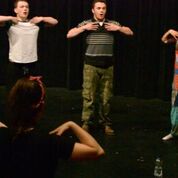 Watching theatre director Robert Price and composer Gary Peacock work with the young people who’d come forward to take part in the production was memerising. Drama students seem to have striking levels of confidence and courage, and they brought those qualities to the first exercises where the dynamic in the room visibly shifted from a number of unconnected individuals to a group that was starting to work together in a cohesive way. One of the techniques that the production might employ is ‘recorded delivery’, where the actors listen to the original interview recordings through headsets and then immediately perform what they hear to the audience. The group practised this with the Lakeside director, Barbara Peirson – there’s something very eerie about hearing someone’s words come, unedited, from the mouth of another. Here, the actors worked in pairs recording and enacting their own mini-interviews; it’s a powerful tool and, using Mike’s interviews, one that has huge potential for re-creating the emotional experiences of earlier generations.
Watching theatre director Robert Price and composer Gary Peacock work with the young people who’d come forward to take part in the production was memerising. Drama students seem to have striking levels of confidence and courage, and they brought those qualities to the first exercises where the dynamic in the room visibly shifted from a number of unconnected individuals to a group that was starting to work together in a cohesive way. One of the techniques that the production might employ is ‘recorded delivery’, where the actors listen to the original interview recordings through headsets and then immediately perform what they hear to the audience. The group practised this with the Lakeside director, Barbara Peirson – there’s something very eerie about hearing someone’s words come, unedited, from the mouth of another. Here, the actors worked in pairs recording and enacting their own mini-interviews; it’s a powerful tool and, using Mike’s interviews, one that has huge potential for re-creating the emotional experiences of earlier generations.
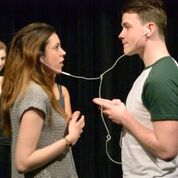 Theatre writer Annecy Lax is developing the raw data into a working script and she brought some of this material to the workshop, both letters and interview extracts. It was deeply moving to hear a young actor read the century-old letter of an injured soldier to his mother about the daily packing of his gaping wound – a mini-horror of mutilation created for those waiting at home – while the company acted as kind of Greek chorus as he spoke, echoing and emphasising particular phrases. As someone who’s more used to dealing with words on paper, it made me re-evaluate the power of the testimony, bringing it to life in a different medium was profoundly affecting. The young performers felt they had a direct, emotional connection to people of their own age from a hundred years ago through the words they were speaking.
Theatre writer Annecy Lax is developing the raw data into a working script and she brought some of this material to the workshop, both letters and interview extracts. It was deeply moving to hear a young actor read the century-old letter of an injured soldier to his mother about the daily packing of his gaping wound – a mini-horror of mutilation created for those waiting at home – while the company acted as kind of Greek chorus as he spoke, echoing and emphasising particular phrases. As someone who’s more used to dealing with words on paper, it made me re-evaluate the power of the testimony, bringing it to life in a different medium was profoundly affecting. The young performers felt they had a direct, emotional connection to people of their own age from a hundred years ago through the words they were speaking.
Contributed by Michael Roper – 14th June
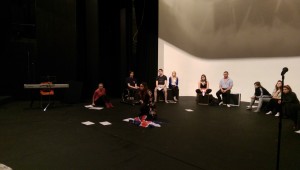 I’ve just come back from a rehearsal of Lakeside Theatre’s production Voices of the Great War, which will be performed on 24th and 25th June. The performance, involving final year Theatre Studies students at Essex, and directed by Robert Price, is based on verbatim recordings with the children of First World War survivors that I undertook between 2011 and 2015. They were in their eighties and nineties at the time, and remembering childhoods between the wars. The scriptwriter, Annecy Lax, has done wonders in turning the passive medium of the one-to-one interview into drama.
I’ve just come back from a rehearsal of Lakeside Theatre’s production Voices of the Great War, which will be performed on 24th and 25th June. The performance, involving final year Theatre Studies students at Essex, and directed by Robert Price, is based on verbatim recordings with the children of First World War survivors that I undertook between 2011 and 2015. They were in their eighties and nineties at the time, and remembering childhoods between the wars. The scriptwriter, Annecy Lax, has done wonders in turning the passive medium of the one-to-one interview into drama.
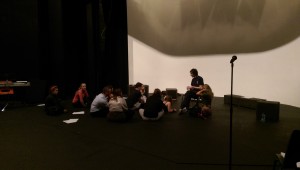 She has put the interviewees (and at times, their parents), into fictional relationships with each other – the son of a double amputee with the girl who never knew her father, the girl whose father died from his war wounds on her fifth birthday with the son of a shell-shock victim. At times the characters appear as the children they once were, living with the effects of war damage, and bringing to life scenes I have imagined in my head many times. At other times they appear as the elderly people they were when I interviewed them, commenting on a time long past. The impact is riveting – a representation of my experience in the interviews, when at points time seemed to telescope and my eighty-something year old interviewee would be back there then in the 1920s and 30s, while at other points, such as when people spoke of the invisibility of the state, the importance of community support, or the necessity for stoicism, the past felt far removed from the present. Lakeside’s production is complex. Unlike an interview, relies on total immersion of the senses: around the dialogue between the characters, soldiers’ songs, letters set to verse, and the sounds and images of trench warfare convey the conflict whose aftermath the play explores. It is fascinating to watch the performance unfold in rehearsal, and I can’t wait for the next viewing.
She has put the interviewees (and at times, their parents), into fictional relationships with each other – the son of a double amputee with the girl who never knew her father, the girl whose father died from his war wounds on her fifth birthday with the son of a shell-shock victim. At times the characters appear as the children they once were, living with the effects of war damage, and bringing to life scenes I have imagined in my head many times. At other times they appear as the elderly people they were when I interviewed them, commenting on a time long past. The impact is riveting – a representation of my experience in the interviews, when at points time seemed to telescope and my eighty-something year old interviewee would be back there then in the 1920s and 30s, while at other points, such as when people spoke of the invisibility of the state, the importance of community support, or the necessity for stoicism, the past felt far removed from the present. Lakeside’s production is complex. Unlike an interview, relies on total immersion of the senses: around the dialogue between the characters, soldiers’ songs, letters set to verse, and the sounds and images of trench warfare convey the conflict whose aftermath the play explores. It is fascinating to watch the performance unfold in rehearsal, and I can’t wait for the next viewing.
Performances will take place on June 24th and 25th at 7.30pm in the Lakeside Theatre, University of Essex, CO4 3SQ, all are welcome.
http://lakesidetheatre.org.uk/whats-on/
Contributed by Rachel Duffett – 17th June
Yesterday evening I sat at the back of the Lakeside Theatre and watched a full run through of the play – thank you all! I could see that it is still a work in progress, that the young cast will continue working with the director, writer and composer to hone and develop the piece over the next week, but for the first time I got a clear sense of the ultimate shape of the performance. It really is a striking and powerful theatrical moment – the blending of verbatim testimony with artistic imagination and dramatic technique has created something utterly compelling.
The play manages to access the power of the personal emotional experiences which are at the forefront of the oral histories Mike Roper collected from the children of WW1 veterans, and at the same time provide a context for them that enhances rather than detracts from their force. Annecy Lax’s script moves back and forth in time and imagines the world of the (now very elderly) children, and by siting their testimony in its place of origin she enhances our understanding of the impact of the conflict. What was it like to grow up with a father whose wounds had to be dressed every day in the family kitchen by his wife? How did it feel to have your father’s uncontrolled post-Somme tremors and confused behaviour ridiculed by classmates? Or to witness the slow decline from battlefield wounds of the father who ‘took twenty years to die’? The play contrives to give us a sense of the reality of those childhoods and a chance to understand more deeply the long lasting yet frequently overlooked legacy of the war in family lives, hidden from the pomp and circumstance of the public and national commemorations that existed, for these families, in some kind of parallel universe.
The energy and courage of the cast is hugely impressive – they are tackling a profoundly affecting set of emotions and memories, and they do it with a skill and sensitivity that is a credit to both their training and their individual spirits. It’s also, of course, a function of the director Robert Price’s vision and the way in which he’s able to communicate that to his company. The amount of time available may in some ways be disproportionate to the size of the challenge, a full scale production of a new piece with a new company in two weeks, yet the pressure seems to enhance rather than detract from the process – although that may be easier for me to say than for those who are putting in so many hours each day in the rehearsal room. Anyway, all I know is that what they’re achieving is worth every minute and I can’t wait to see the first performance next Friday. After years of working with WW1 testimony and becoming all too familiar with the tragedies it contains, that familiarity was pierced last night when the young Frances explains, with a mix of uncertainty and awe, to her friends that her birthday party is cancelled because ‘My daddy died this morning.’
Contributed by Michael Roper – 24th June
Tonight is the opening night of Lakeside Theatre’s production of Voices of the Great War. Although I’ve read the script and dropped in on rehearsals at various points in the past couple of weeks, this will be my first full viewing. I feel proud and very touched that the people I interviewed have found a place in this performance. Many of the children of disabled soldiers that feature in the production felt strongly that their experiences of living in the aftermath had not been properly understood, and were not part of the historical record. The play literally ‘gives voice’ to them, in a manner and with a directness that, as an historian, I could scarcely have imagined when I did the interviews. Of course the verbatim testimony and the dialogue is only one part of the performance, which encompasses music, poetry, movement and choreography, and a wonderful set consisting of turn of the century domestic and military objects dangling from strings, in a kind of mobile sculpture whose shadows suggest the haunting capacity of the war. The drama ends with the children becoming adults, and being drawn into yet another global conflict. There will be a Q and A session after tonight’s performance – watch this space!
Contributed by Michael Roper – 24th and 25th June
Five weeks of intensive work by cast and crew bore fruit on Friday and Saturday when Voices of the Great War was performed by Theatre Studies students here at the Lakeside Theatre. Rachel and I have come to the rehearsals, but even so I wasn’t prepared for the subtle and complex way in which the play depicts the situation of children of disabled WW1 soldiers. The thing that struck me most was the emotional power of the performance. Yet as members of the audience noted, the play does not pull at your heartstrings, and in fact explores the psychological effects of emotional reticence and repression: it is the verbatim testimony, and dramatized encounters between the interviewees as children, which moves. Annecy Lax’s script is insightful about the historical and social situation of these children. I attended on both nights and with each performance, kept noticing more. The audience has to work hard as they follow Edward, Brian, Evelyn and Frances, the play criss-crossing between different phases of life: as young children and as adolescents, as young adults parting from friends and family at the outbreak of the Second World War, and in late life. Poetry, excerpts from letters home, sounds of machine-gun fire and soldier’s songs (Take me Back to Dear old Blighty; Hanging on the Old Barbed Wire), convey the war that was in the background of their lives. Original music scores, often discordant, contribute to a feeling of unsettlement. The play represents the children’s struggles to fathom tragedies like a father’s early death from war wounds, and having to adjust to fathers who, whether because of their wounds, physical and mental, did not conform to mid-twentieth century norms of fatherhood and manliness. Brian, whose father was shell-shocked, takes up boxing and becomes a fireman; Edward’s pain from a sprained shoulder is dismissed as nothing by the doctor who fought alongside his father. The play ends with a snippet of my recorded interview with Evelyn, as she recalls a soldier’s return from leave when she was around two and a half. She tells me that she does not know if it is a memory of her father, who never returned from the war, or someone else, perhaps her uncle. The passage symbolises the uncertainty that this generation felt about a past that haunted them, but which they were never quite witnesses to.
There was a Q and A at the end of each performance, and what surprised me on each night was how close some members of the audience felt to what they were seeing: more than a century on, many people still carry the legacies of that war, and it seems that this performance enables them to identify with kindred experiences that are not, as yet, properly touched by historical study of the war or the centenary commemorations.
It looks as if the play will be performed again at Lakeside in November – watch this space!

